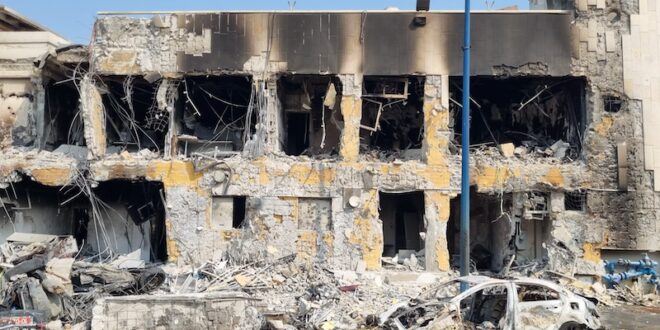Israeli forces carried out attacks in the Gaza Strip, Syria and on the border with Lebanon overnight into Sunday, amid concerns that the conflict between Israel and militant group Hamas could turn into a wider Middle East war.
Hamas said at least 55 people were killed overnight in Israeli airstrikes conducted on the Gaza Strip, where Israel has maintained a steady drumbeat of attacks since the Hamas operation that killed some 1,400 people in Israel earlier this month.
In Syria, state news agency SANA said Israeli missiles hit the airports in the capital of Damascus and the northern city of Aleppo, damaging their runways. It said one airport worker was killed in the attacks and one was injured. Flights have been transferred to Latakia Airport.
Israeli forces have struck both the Damascus and Aleppo airports several times over the past year. The Times of Israel said Israel is believed to be attempting to prevent the shipment of weapons from Iran to Middle East proxies, the most prominent being Lebanon-based Hezbollah.
Meanwhile, Israeli authorities announced Sunday that 14 Israeli communities near the Lebanese border will be evacuated. The locations have been subjected to rocket and missile attacks from Iran-backed Hezbollah and Palestinian groups since the deadly October 7 Hamas attack on Israel.
U.S. Defense Secretary Lloyd Austin and Secretary of State Antony Blinken both said in interviews Sunday the United States is concerned about the Israel-Hamas war expanding in the Middle East.
Austin told ABC’s “This Week” show, “We’re concerned about potential escalation…a significant escalation.” But he said the U.S. has “the ability to respond,” noting that a U.S. Navy warship shot down drones launched from Yemen that might have been headed toward Israel.
“We maintain the right to defend ourselves and we won’t hesitate to respond,” Austin said.
Blinken told NBC’s “Meet the Press” show, “We expect that there’s a likelihood of escalation. Escalation by Iranian proxies directed against our forces, directed against our personnel.”
“We are taking steps to make sure that we can effectively defend our people and respond decisively if we need to,” the top U.S. diplomat said. “This is not what we want, not what we’re looking for. We don’t want escalation. We don’t want to see a second or third front develop. We don’t want to see our forces, or our personnel come under fire. But if that happens, we’re ready for it.”
Blinken said the U.S., while warning Hezbollah against expansion of fighting against Israel from Lebanon, has “deployed very significant [military] assets to the region, two aircraft carrier battle groups, not to provoke, but to deter, to make clear that if anyone tries to do anything, we’re there.”
Israeli fighter jets struck Hezbollah targets in Lebanon on Saturday. Hezbollah said that six of its fighters were killed Saturday on the border, increasing to 19 the number of its fighters killed in the last two weeks.
The Israeli military said one of its soldiers on the border was hit by an anti-tank missile and severely wounded.
The fighting along the Lebanon-Israel border is the worst since the 2006 war between Israel and Hezbollah.
Also Saturday, Israel said its aircraft struck a compound beneath a mosque in the West Bank, where members of Hamas and Palestinian Islamic Jihad were planning an “imminent terror attack.”
WAFA, the Palestinian Authority’s official news agency, said at least one person was killed in the strike and several others were injured in the compound beneath al-Ansar Mosque in Jenin refugee camp.
The Israeli airstrike is at least the second in recent days to hit the occupied West Bank, where violence between Jewish settlers and Palestinians has surged since Hamas gunmen from Gaza carried out their deadly October 7 rampage in Israel.
Israel has positioned about 300,000 military personnel around the Gaza Strip for a threatened invasion.
Asked about invasion plans Saturday, Israeli Rear Admiral Daniel Hagari told reporters that Israel will intensify its attacks in northern Gaza to prepare for the next stage of the war.
Cairo summit
A summit hosted by Egypt on Saturday failed to reach an agreement on how to contain the violence between Israel and Hamas. Arab leaders condemned the Israeli bombardment of Gaza while mostly Western countries said civilians should be shielded. Israel did not attend, while the Reuters news agency reports the U.S. sent a charge d’affaires who did not address the meeting.
At the summit in Cairo, Jordan’s King Abdullah decried what he called global silence about Israel’s attacks, which have killed more than 4,000 people in Gaza, the Gaza health ministry said Saturday, and made more than 1 million homeless.
He urged an even-handed approach to the Israeli-Palestinian conflict.
Limited aid arrives
The Rafah crossing between the Gaza Strip and Egypt opened Saturday for the first time since the October 7 Hamas attack. A convoy of about 20 trucks delivered food, water, medicine, and other necessities to Gaza residents.
Cindy McCain, the executive director of the U.N.’s World Food Program, told ABC that 17 more truckloads of humanitarian aid passed into Gaza on Sunday and that another 40 are expected Monday, but that the need for more assistance is substantial.
Palestinian officials expressed disappointment that Gaza did not receive supplies of fuel.
“Excluding the fuel from the humanitarian aid means the lives of patients and injured will remain at risk. Gaza hospitals are running out of the basic requirements to pursue medical interventions,” the Gaza health ministry said, adding that the aid was only 3% of what it used to get in Gaza before the crisis.
The United Nations has been pressing Israel and Egypt to allow aid to flow freely into Gaza, where hundreds of thousands need assistance after two weeks of bombing and a strict blockade of food and fuel by Israel.
The United Nations said the aid would be received and distributed by the Palestinian Red Crescent, with the consent of Hamas, which controls Gaza.
 Eurasia Press & News
Eurasia Press & News



